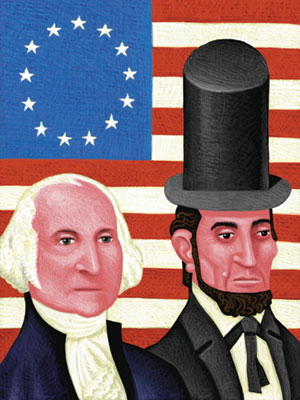
When I was in the fourth grade in Danville, Indiana, I had three teachers, Mrs. Conley, Abraham Lincoln, and George Washington. Mrs. Conley did the heavy lifting, instructing, grading our papers, and collecting our lunch money. Abraham Lincoln and George Washington stood ready to assist, peering at us from over the chalkboard, Father Abraham with his kindly countenance, George Washington with his face twisted up, prune-like, his dentures pinching, curious to see what his country had become. I think he was pleased with Mrs. Conley, her dignity, her unflappability, her keen intelligence. Then he looked at us and frowned, worried for the nation to which he had devoted his life.
This was back in the olden days, before we lumped all the presidents together into Presidents Day, giving Millard Fillmore equal billing with Messrs. Lincoln and Washington. Back then, we confined our tributes to Abe and George. Mr. Lincoln, a fellow Hoosier, received the lion’s share of our attention. Mrs. Conley read the Gettysburg Address while we thought of the war dead piled high on the Pennsylvania fields. Rachelle Wiggam, an unusually sensitive child, wept into her handkerchief, while Bernie Fender sprawled in his seat, felled by an imaginary bullet, feigning a soldier’s death.
Mrs. Conley told how George Washington cut down his father’s cherry tree, then confessed his misdeed, hoping to one day inspire schoolchildren with his honesty, and so he did, until Bernie Fender said, “I would have blamed it on my brother.” And then we thought maybe Bernie had a point and that George Washington wasn’t that smart after all. We had doubts about George Washington anyway, wondering why any self-respecting man would wear a wig.
After the cherry tree story, Mrs. Conley led us to the cafeteria where Mrs. Sisk, the school cook, was waiting with a cake that vaguely resembled Abraham Lincoln. I was a big fan of cake, but this felt cannibalistic, so I gave Rachelle Wiggam my piece, hoping she would remember my kindness when we were older and marry me and bear my children, one of whom would grow up to be the president of the United States and let us live in the White House where I could have cake anytime I wished and not just on birthdays.
After visiting the cafeteria, we returned to our classroom where Mrs. Conley told us about John Wilkes Booth shooting Abraham Lincoln in the theater.
“I thought he shot him in the head,” Bernie Fender cackled, and was sent to the principal, Mr. Peters, who looked a bit like George Washington, if George Washington had worn a flattop and farm boots.
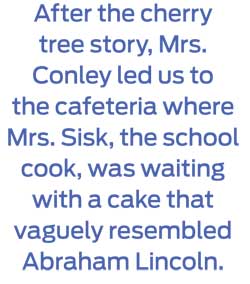
Mrs. Conley told about Lincoln’s funeral train rolling through Lebanon, 21 miles north of us, on State Road 39. People lined the railroad tracks, the women weeping, the men removing their hats and bowing their heads, the children mute, holding their parent’s hands. Mrs. Conley spoke as if she had been there, and for a moment I thought perhaps she had. She was old, well into her 40s, but not old enough.
I asked Mrs. Conley if there were anyone alive who had ever seen President Lincoln.
She thought, then said, “Probably not. But there might be someone alive in our town whose parents did.”
I thought of Mr. Hoban who lived down the street from us and was so old he had fungus on his neck. After school I stopped by his house to ask if his parents had seen Lincoln’s funeral train. If so, they hadn’t told him. Then he showed me his military gear from World War I, and told me about the trenches at Flanders, but that didn’t strike my fourth-grade mind as interesting, so I excused myself and went home and watched Batman, who everyone knew was a genuine hero, even though he wore leotards, which no self-respecting man would do.
Become a Saturday Evening Post member and enjoy unlimited access. Subscribe now
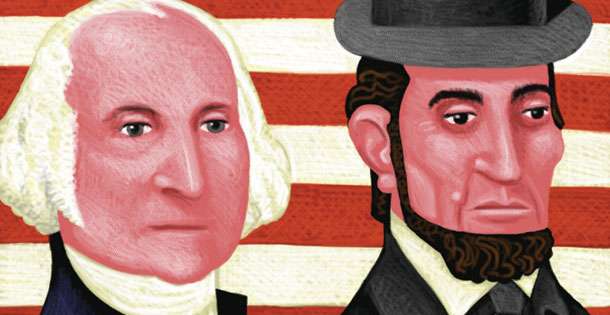

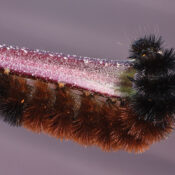
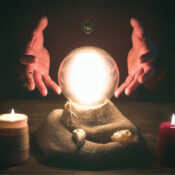
Comments
Maybe we should offer a traditional classroom and contemporary classroom like we do for church services. Wonder how many kids would choose desks over beanbags and Big Chief over iPad?
Thank you Philip for this article. Mrs. Conley sounded like a wonderful teacher, who had extensive knowledge on both Presidents Washington and Lincoln. In grade school for me also, both mens portraits were always in the classroom.
Changing their birthdays to the generic Presidents’ Day takes away from Washington and Lincoln in my opinion, and just lops them in with all the others such as Fillmore and other less than stellar Presidents.
I’m glad you had the chance to speak with Mr. Hoban and made a historical connection with a World War l veteran. When I was 9 and 10 in the fourth grade
(1966-’67) I watched ‘Batman’ too. They were brand new episodes twice a week! Same thing in the fifth grade. I’m evenly split as to preferring Julie Newmar or Eartha Kitt as ‘Catwoman’, but know for sure NO other version of ‘Batman’ can touch the creative brilliance of that series that was only possible in the Soaring Sixties. Same thing with ‘The Monkees’, also 1966-’68.